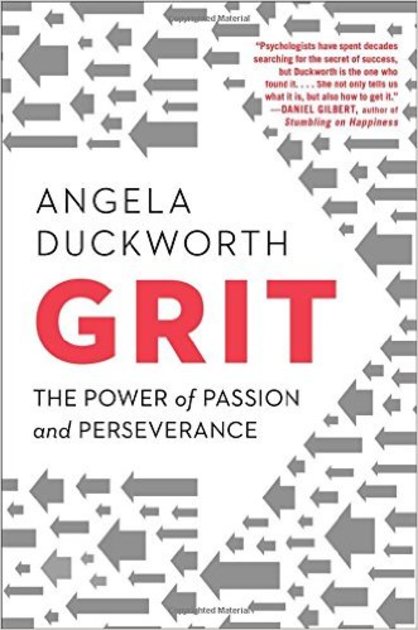
Originally published Queens Jewish Link 2016
Grit: The Power of Passion and Perseverance by Angela Duckworth
Grit author and researcher Angela Duckworth wants readers to know that talent is not what makes success. Many people conceptualize success as happening because of talent, which makes success seem like the luck of the draw. However, studies show that effort is actually a much higher predictor of success than talent. Grit is the combination of passion and perseverance which translates into achievement through effort, talent, and skills grown in practice. This is encouraging to hear: grit grows if we cultivate it, our skills can grow if we practice, and we can become successful no matter what "talents" we may or may not have been born with. What matters more is how consistent and committed we are to our work or life's purpose, and that is what will promote success and fulfillment.
Grit is composed of interest, practice, purpose, and hope. Working in something you are passionate about or interested in will keep you motivated through the hard work. Thinking of your work as a calling, instead of a career or a job, means that you love what you do and it gives you purpose. You probably want to put in your utmost effort to become the best at it, even when it takes a lot of practice. Hope will help you keep going despite inevitable obstacles. If you have all these factors, you are more likely to stick with a project or work area long-term and make strides in it. Jumping around from thing to thing ensures that you know a little about a lot. Sticking to something for a long time will increase likelihood of success. However, Duckworth makes the point that sticking to something stubbornly may not always be the right choice. Consistently evaluating what you are doing, and letting go of things that are not on the path towards your major goal, helps you keep from being distracted from your true goal.
Duckworth discusses how parents and teachers can encourage grit in their charges. Children need supportive and demanding caretakers to encourage grit. Parents can notice what their children become interested in and nurture that interest, and encourage them to go further with it. Furthermore, if parents are not the best at teaching grit, tough love from a coach or teacher can have the same positive effects. Studies show that children who stick with an extracurricular activity for two years or more, as opposed to just one year, show gritty traits later in life. Additionally, surrounding yourself with others who are gritty or joining a gritty culture, such as a sports team, can influence you to have more grit.
I have always admired those in my family who seem to be very "gritty", working hard and doing whatever it takes to get stuff done. I've seen myself as less of a hard worker, unless it is something that I really love and feel a commitment to. I am more likely to be "gentle" with myself, listen to my emotions and my body when it comes to working on something and usually don't do things that I don't think are healthy for me. When I first came across this book, I was wondering how would one integrate the value of listening to yourself and your limits with the values of grit and effort. I think the answer lies in choosing your commitments. Duckworth discusses how gritty people have one overarching life goal, and most of their time devote themselves to shorter term goals in service of the life goal, instead of dabbling in many different projects and purposes.
The biggest takeaway I got from this book was the concept of deliberate practice. Deliberate practice varies from regular repetition by noticing and honing in on what needs to be improved with each repetition and then improving it. You can do something over and over, but not learn anything from it if you don't reflect on your mistakes and what could have been better. If I feel devoted to my work, then I will put in effort to carefully practice and go over my mistakes to learn the most that I can from them. If I want to get better at what I do, I need to take time to reflect and notice what worked and what didn't work so I can use that information for the future. Grit made me start thinking about how I want my work to be my calling and not only a career, and how I can deliberately improve my skills.
 Previous
Previous

